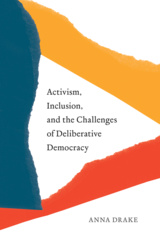
Deliberative Democracy in Practice
Deliberative democracy has emerged as a dominant research paradigm in normative political philosophy. Deliberative democrats want politics to be more than a clash of contending interests, and they believe political decisions should emerge from reasoned dialogue among citizens. But can these ideals be realized in complex and unjust societies?
Deliberative Democracy in Practice brings together leading scholars who explore debates in deliberative democratic theory through the lens of four areas of practice: education, constitutions and state boundaries, indigenous-settler relations, and citizen participation and public consultation. For instance, can the desire to rear deliberative citizens be reconciled with the freedom of parents to raise their children in their own belief systems? Do those who live outside the borders of a democracy deserve a say in decisions that affect them? What challenges do indigenous peoples, who have been the subject of historical injustice, pose to theories of deliberative democracy? To what extent do real-world designs for citizen participation and consultation live up to the norms of deliberative democracy?
This dynamic volume casts new light on the strengths and limitations of deliberative democratic theory, offering guidance to policy makers and to students and scholars interested in democratic justice.
Deliberative Democracy in Practice will be of interest to those studying deliberative democratic theory and citizen engagement, as well as those with interests in the following policy areas: religion and education, democracy and constitutionalism, indigenous-settler relations, and the design of public consultations. It will appeal to students and scholars in Political Science, Philosophy, Education, Sociology, and Law.
David Kahane is an associate professor and Vargo Distinguished Teaching Chair in the Department of Political Science at the University of Alberta. Daniel Weinstock is a professor of philosophy and Canada Research Chair in Ethics and Political Philosophy at Université de Montréal. Dominique Leydet is a professor of philosophy at Université de Québec à Montréal. Melissa Williams is a professor of political science at the University of Toronto.
Contributors: James Bohman, Harry Brighouse, Simone Chambers, Glen Coulthard, James Fishkin, John Forester, David Kahane, Duncan Ivison, Micheline Milot, Henry S. Richardson, Jorge Valadez, and Paul Weithman
Introduction / Daniel Weinstock and David Kahane
Part 1: Educating Deliberative Citizens
1 Conceptions of the Good: Challenging the Premises of Deliberative Democracy / Micheline Milot
2 Religious Belief, Religious Schooling, and the Demands of Reciprocity / Harry Brighouse
3 Religious Education and Democratic Character / Paul Weithman
Part 2: Deliberative Democracy, Constitutions, and the Boundaries of Deliberation
4 Open versus Closed Constitutional Negotiation / Simone Chambers
5 Is Democracy a Means to Global Justice? / James Bohman
Part 3: Deliberative Democracy and Indigenous Peoples
6 Deliberative Democracy and the Politics of Reconciliation / Duncan Ivison
7 Resisting Culture: Seyla Benhabib’s Deliberative Approach to the Politics of Recognition in Colonial Contexts / Glen Coulthard
8 The Implications of Incommensurability for Deliberative Democracy / Jorge M. Valadez
Part 4: Citizen Dialogue and Decision Making in a Deliberative Democracy
9 Public Opinion and Popular Will / Henry S. Richardson
10 Consulting the Public Thoughtfully: Prospects for Deliberative Democracy / James Fishkin
11 The Micropolitics of Deliberation: Beyond Argumentation to Recognition and Justice / John Forester and David Kahane
References
Index







